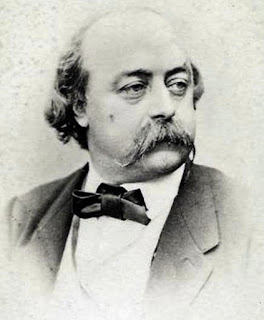Gustave Flaubert (1821-1880) was a French writer and novelist born near Rouen. The son of a prosperous surgeon, Flaubert was educated locally in Rouen and then was sent to Paris to study law. His studies, which he pursued with slight enthusiasm, were terminated by an attack of a peculiar nervous disease that was to remain with him the rest of his life. To a great extent the delicate condition of his health determined the general course of his career. Upon the death of his father in 1846 Flaubert returned to the family estate near Rouen, and with the exception of occasional journeys abroad he remained there until his death. Although Flaubert never married, he developed strong attachments to several women, among them George Sand (pseudonym of Amadine Aurore Lucie). He numbered among his many friends the writers Emile Zola, Guy de Maupassant, Victor Hugo, Ivan Turgenev, and Alphonse Daudet. His later years were embittered by concern over the course of the Franco-Prussian War, personal financial reverses, and the death of his mother, as well as his steadily declining health.
Although Flaubert was strongly influenced by the romantic writings of Hugo and Balzac during his early career, his literary style changed to the extent that he was soon recognized as the master of naturalism in French fiction. In many respects, however, he remained a romantic. Writing was difficult for Flaubert. Because of this and the fact that he was a perfectionist, constantly striving for what he called le mot juste (French, the exact phrasing), he produced relatively little.
With Madame Bovary, his first published novel and generally considered his masterpiece, Flaubert established himself among the great novelists of the 19th century. Flaubert's next major work was Salammbo, a novel inspired by a trip to the site of ancient Carthage. In 1869 appeared The Sentimental Education (which Flaubert considered to be his masterpiece) and in 1874, The Temptation of St. Anthony. Both of these works had been published in part many years earlier but had been rewritten several times before being published in their final form. Three Stories (1877) was the last of Flaubert's works to appear during his lifetime. Posthumous publications included two plays, the satirical novel Bouvard and Pécuchet (unfinished), and miscellaneous essays, travel reminiscences, and correspondence.
